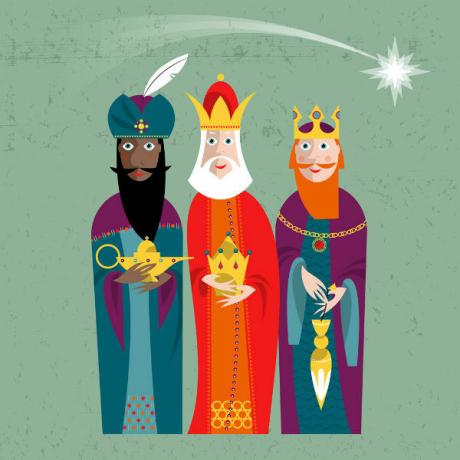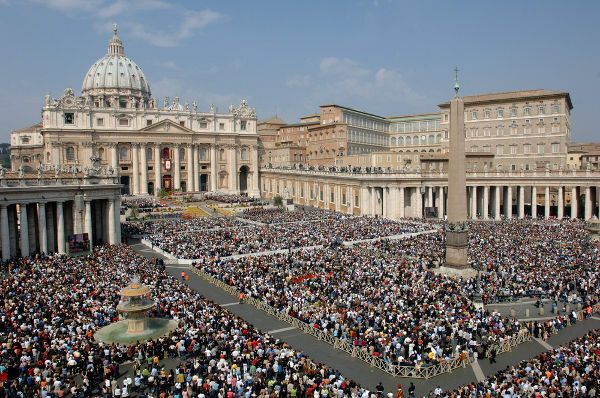You Magi, according to what we know from the biblical narrative, are characters who came from the East looking for Jesus – newborn – to give him adoration and offer him gifts. Called “wizards” in the Bible, these characters were converted into kings over time and are commonly known today as “three wise men”.
The wise men are well known characters in the Christian tradition, being celebrated on the day January 6th, date we call Kings' Day. It is believed that they may have received the "title" of kings during the Middle Ages and became known in the tradition as balthazar, gaspar and Melchior.
Accessalso: Discover the historical origins of one of the most important festivals in Christianity
The wise men in the Bible

The only record of the magicians in the Bible is found in the Gospel of Matthew, in chapter 2, verses 1-12. In reading the text, we can identify that, when Jesus was born, Israel was ruled by Herod. Jesus' birth took place in Bethlehem, according to prophecy, and with the birth, three wizards from the East were guided by a star to the place that housed the newborn Christ.
Arriving in Israel, the magicians sought out Herod to ask him where the newborn king of the Jews was. Herod guided them about what the prophecies said and also about the rising of the star, and he told them to continue their search, but let him know where the baby Jesus was, as he also wanted worship. Herod, however, was deceiving the magicians and wanted to know where Jesus was to kill him.
The magicians continued following the star of Bethlehem and found the newborn in a manger in Bethlehem. They then worshiped Jesus and offered him three gifts: incense, myrrh and gold. Then the magicians were told by God in a dream that they were not to report anything to Herod and then returned to their land by another path.
The biblical account does not refer to the magicians as kings at any time and this is identified in different translations of the text. The New International Version of the Bible uses the expression "wizards from the East". In Today's New Language, the account presents them as "some men who studied the stars." Another version known as the New Transforming Version, introduces wizards as "sages" or "royal astrologers".
Thus, a relationship that we can make through these versions and based on the reports of scholars is that the term "magician" was used to refer to wise, menscholars, scholars. It is believed that magicians could be astronomers or same astrologers, as some versions say they studied the stars.
Why do we call wizards kings?
Many wonder why we call wizards kings, since the biblical narrative does not use this term to designate them. The origin of the use of king to refer to magicians is unknown to historians. They only know that wizards came to be called kings sometime between the late Ancient and Middle Ages.
Some mention that the first reference to wizards as "wizards" was made by Tertullian, in the third century. This conclusion that the magicians were kings is believed to have resulted from an interpretation which suggests that the text in Matthew demonstrates the achievement of prophecies located in Isaiah and Psalms, which suggest that kings would bring gifts and kneel before the Messiah.
Accessalso: See when a Christian holiday, always celebrated on a Thursday, arose
Names of the wise men
Currently, Christian tradition holds that the three wise men were called gaspar, balthazar or Belchior (or Melchior). It is not known whether these were actually the names of the wise men, but it is believed that these names were assigned because of a written document produced around the year 500 by an unknown author.
This document is known as exceptLatinbarbari and it says that the magicians who brought gifts to Jesus were called Bitisarea, Melichior and Gathaspa. Since then, a tradition has been consolidated, so much so that in the eighth century, writings of bede, the venerable, a Doctor of the Church, already presented the names of the magicians in the mentioned form: Gaspar, Baltasar or Belchior (which could also be Melchior).
Origin of the wise men
This subject is another practically impossible to affirm certainties. Taking into account the biblical account, the Magi came from the East, which we can consider that the Magi may have come to the east of where the region of present-day Palestine was. Again using the account of Bede the Venerable, which appears in the Excerpta et Colletanea, the mages' places of origin are as follows:
- Melchior/Belchior: originating from ur, land of the Chaldeans;
- gaspar: from regions close to the SeaCaspian;
- Balthazar: from regions close to the GulfPersian.
Taking the writing of Bede, it is concluded that the wise men came from Babylon, Persia and arabia, but, as said, it is difficult to reach conclusions using only the text of Bede as a basis. There are also theories that analyze the possibility that they originate from the same region.
How many wise men were there?
In the Christian tradition, the information that the wise men were three. Many believe that this was in direct relation to the fact that the biblical narrative speaks of three gifts, thus, three magicians. A theologian named Brent Landau carried out the translation of a Syrian document, probably from the 2nd century and of unknown author, which suggests that the magicians were in total of twelve and that they could come from a mystical place that probably goes back to where we find present-day China. Other studies carried out with ancient documents suggest the existence of four wizards.
Accessalso: Learn more about the most important celebration of Christianity
relics of the wise men

Currently, there are holy relics of the wise men who are located in Cologne, in Germany. Different legends told that the wise men had been buried in the same place, which was supposedly in the Arabian Peninsula or in Persia. Later, their remains would have been taken to Constantinople, by order of Saint Helena, mother of Emperor Constantine.
Later, the relics of the wise men would have been taken to Milan, northern Italy, and, since the 12th century, are in Cologne, Germany. This happened in 1164, when Frederico Barba Roxa, emperor of the Holy Roman Empire, led the attack and sack of Milan. The relics of the wise men, turned Cologne into an important pilgrimage center.
The reliquary of the wise men is currently inside the Cologne Cathedral, a church built from the 13th century and known as one of the great symbols of Gothic architecture.
Image credits:
[1]Mikhail Markovskiy / Shutterstock

